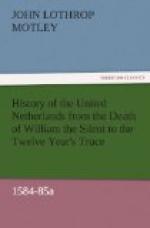They must have been easily satisfied, if they knew as much of the dealings of her Majesty’s government as the reader already knows. To inspire doubt of the French, to insinuate the probability of their not “keeping touch and covenant,” to represent their rule as “cumbersome and perilous,” was wholesome conduct enough towards the Netherlanders—and still more so, had it been accompanied with frank offers of assistance —but it was certainly somewhat to “hinder the courses of the French.”
But in truth all parties were engaged for a season in a round game of deception, in which nobody was deceived.
Walsingham was impatient, almost indignant at this puerility. “Your doings, no doubt of it,” he wrote to Davison, “are observed by the French faction, and therefore you cannot proceed so closely but it will be espied. Howsoever it be, seeing direction groweth from hence, we cannot but blame ourselves, if the effects thereof do not fall out to our liking.”
That sagacious statesman was too well informed, and too much accustomed to penetrate the designs of his antagonists, to expect anything from the present intrigues.
To loiter thus, when mortal blows should be struck, was to give the Spanish government exactly that of which it was always most gluttonous— time; and the Netherlanders had none of it to spare. “With time and myself, there are two of us,” was Philip II.’s favourite observation; and the Prince of Parma was at this moment sorely perplexed by the parsimony and the hesitations of his own government, by which his large, swift and most creative genius was so often hampered.
Thus the Spanish soldiers, deep in the trenches, went with bare legs and empty stomachs in January; and the Dutchmen, among their broken dykes, were up to their ears in mud and water; and German mercenaries, in the obedient Provinces, were burning the peasants’ houses in order to sell the iron to buy food withal; while grave-visaged statesmen, in comfortable cabinets, wagged their long white beards at each other from a distance, and exchanged grimaces and protocols which nobody heeded.
Walsingham was weary of this solemn trifling. “I conclude,” said he to Davison, “that her Majesty—with reverence be it spoken—is ill advised, to direct you in a course that is like to work so great peril. I know you will do your best endeavour to keep all things upright, and yet it is hard—the disease being now come to this state, or, as the physicians term it, crisis—to carry yourself in such sort, but that it will, I fear, breed a dangerous alteration in the cause.”




